
Unlocking Descriptive Power: A Comprehensive Guide to Adjectives Worksheets for Grade 2
In the vibrant world of second-grade education, laying a strong foundation in language arts is paramount. As young learners progress from basic word recognition to constructing more complex sentences, understanding the nuances of grammar becomes increasingly crucial. Among the many grammatical concepts introduced, adjectives stand out as powerful tools that bring language to life, adding color, detail, and precision to descriptions. For educators and parents alike, a well-designed set of adjectives worksheets for Grade 2 can transform abstract concepts into tangible learning experiences, making the journey of linguistic discovery both engaging and effective.
This article delves deep into the importance of adjectives for second graders, explores the characteristics of effective worksheets, provides examples of various types of activities, and offers practical tips for maximizing their educational impact.
Why Adjectives are Crucial for Grade 2 Learners

Before diving into worksheets, it’s essential to understand why mastering adjectives is so vital for a second grader:
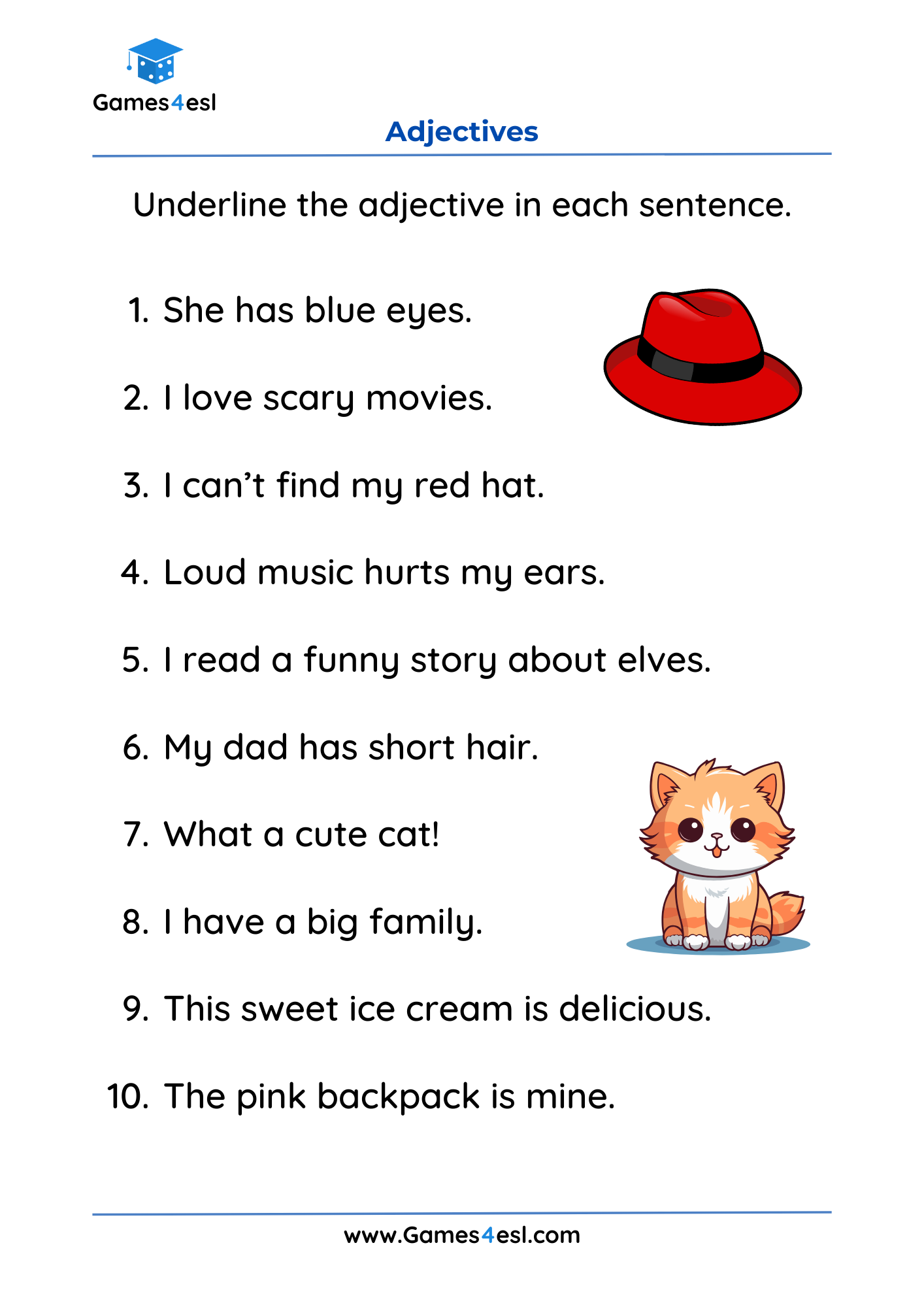
- Enhancing Descriptive Writing: Adjectives are the bedrock of descriptive writing. They allow children to paint vivid pictures with words, moving beyond simple statements like "The dog ran" to "The fluffy, brown dog ran quickly." This skill is fundamental for creative writing, storytelling, and even academic reports.
- Improving Reading Comprehension: When children encounter adjectives in texts, their ability to visualize and understand the described elements improves dramatically. Knowing that "a colossal tree" means a very large tree helps them grasp the full meaning of a sentence or paragraph.
- Expanding Vocabulary: Learning adjectives naturally introduces children to a wider range of words. Worksheets often expose them to synonyms and antonyms, enriching their lexicon.
- Developing Critical Thinking and Observation: Identifying adjectives often requires careful observation of objects, people, or situations. What color is it? How does it feel? What size is it? This process hones their observational skills.
- Building a Foundation for Complex Grammar: Understanding adjectives sets the stage for more advanced grammatical concepts, such as adverbs, comparative and superlative adjectives, and phrases.

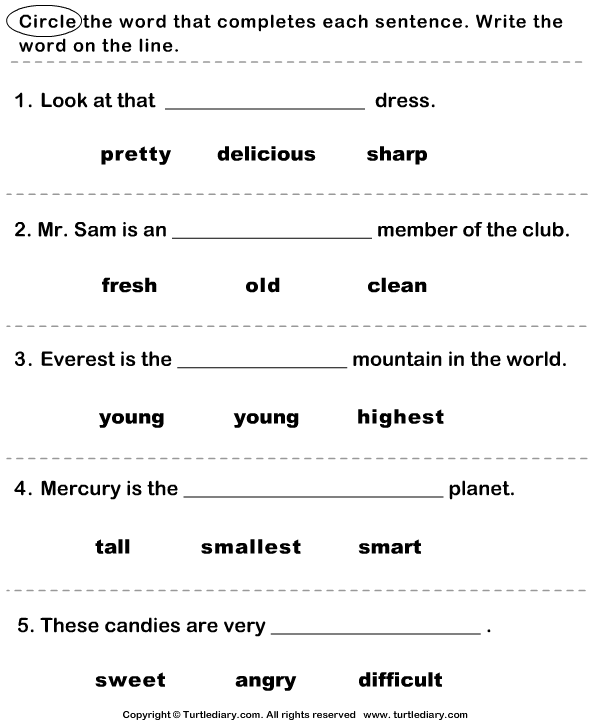
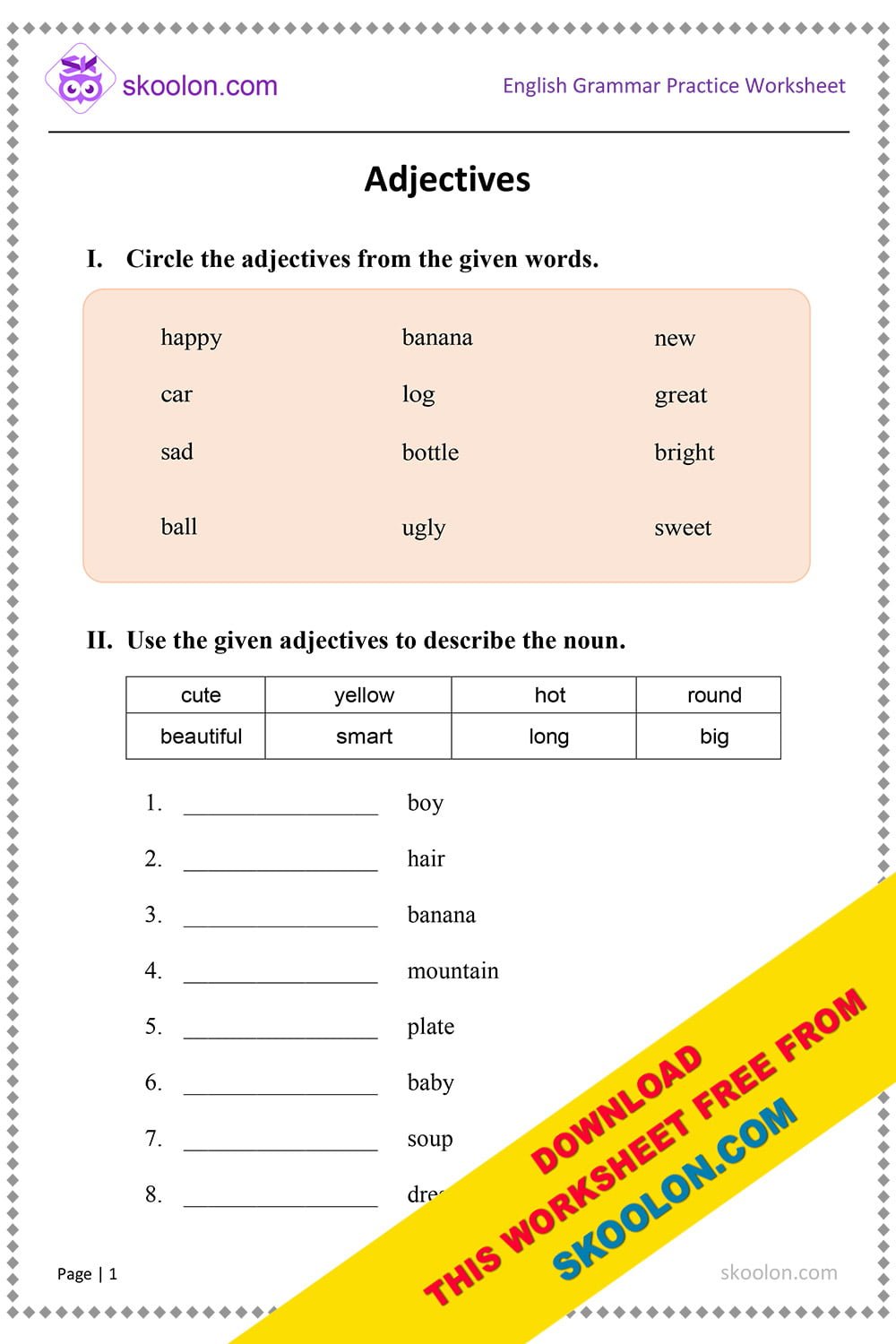
Characteristics of Effective Adjectives Worksheets for Grade 2

The best adjectives worksheets for Grade 2 are those that capture a child’s imagination while effectively reinforcing the concept. Here are key characteristics to look for:
- Age-Appropriate Language and Concepts: The vocabulary used in instructions and examples should be familiar or easily understood by a second grader. Sentences should be simple and direct.
- Engaging Visuals: Bright colors, relatable illustrations, and clear layouts make worksheets appealing and less intimidating. Visual cues can help children connect the adjective to the noun it describes.
- Variety of Activities: Repetition is good, but monotony is not. Worksheets should offer different ways to interact with adjectives to keep children engaged and reinforce learning from multiple angles.
- Clear Instructions: Instructions should be concise, explicit, and easy for a child to follow independently or with minimal guidance.
- Relatable Themes: Worksheets that use themes familiar to second graders (animals, toys, food, nature, school, family) make the learning more relevant and enjoyable.
- Gradual Difficulty: Start with basic identification and gradually introduce more complex tasks like choosing the best adjective or writing descriptive sentences.
- Opportunities for Creativity: Some worksheets can include open-ended sections where children can draw or write their own sentences using adjectives.
- Self-Correction/Answer Keys (for parents/teachers): While not for the child to use during the activity, an answer key is invaluable for quick checking and feedback.
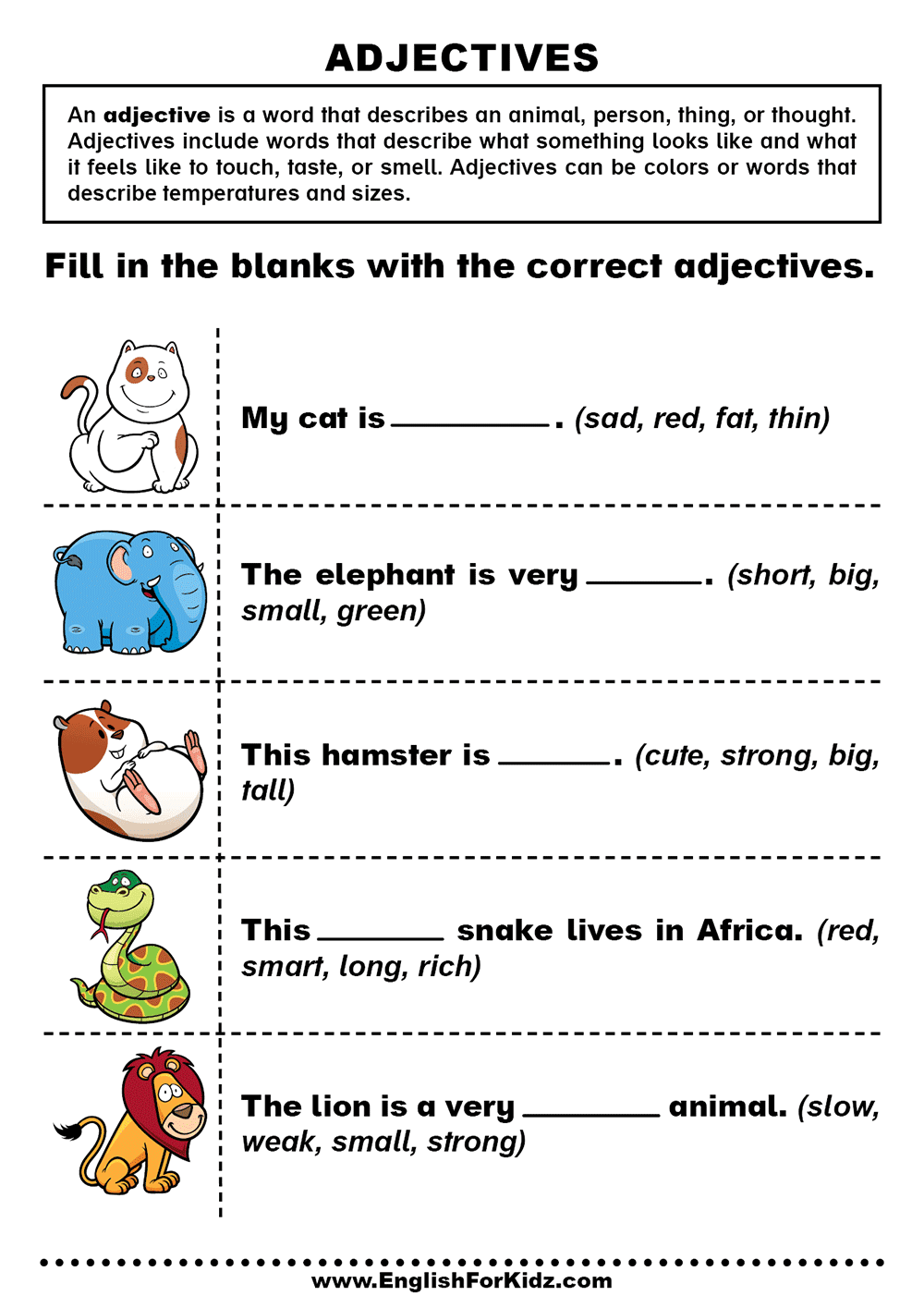
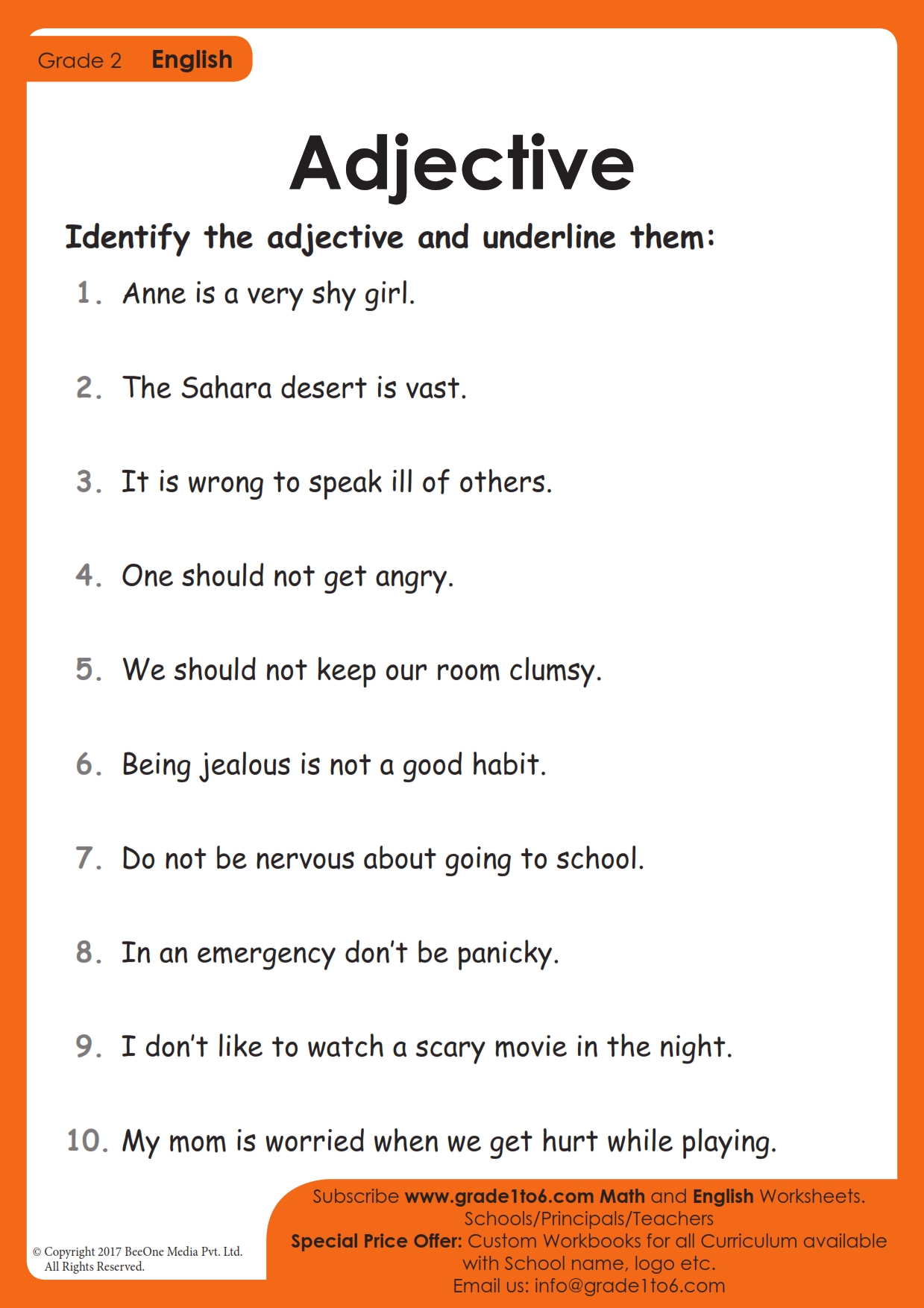

Types of Adjectives Worksheets for Grade 2
A diverse collection of adjectives worksheets for Grade 2 can target different aspects of learning. Here are some popular and effective types:
-
Identifying Adjectives:
- Activity: Children are given a list of sentences or a short paragraph and asked to underline, circle, or highlight all the adjectives.
- Example: "The big, red ball bounced high. The happy girl caught it with her small hands."
- Benefit: Helps children recognize adjectives in context and distinguish them from other parts of speech.
-
Matching Adjectives to Nouns:
- Activity: Two columns are provided: one with adjectives and one with nouns. Children draw lines to match an adjective to a suitable noun.
- Example:
- Adjectives: fluffy, juicy, shiny, tall
- Nouns: cloud, apple, car, tree
- Benefit: Reinforces the concept that adjectives describe nouns and helps build vocabulary by creating logical pairs.
-
Fill-in-the-Blank Sentences:
- Activity: Sentences are provided with a blank space where an adjective should go. Children choose from a word bank or come up with their own appropriate adjective.
- Example: "The ___ cat purred loudly." (Word bank: soft, loud, fast)
- Benefit: Encourages children to think about context and select the most fitting descriptive word.
-
Describing Pictures:
- Activity: A picture is shown (e.g., a bustling park, a colorful animal). Children are asked to write as many adjectives as they can to describe what they see, or to write sentences using adjectives about the picture.
- Example: (Picture of a busy playground) "The playground has a tall slide and swinging children. A red ball rolls on the green grass."
- Benefit: Connects abstract words to concrete visuals, promoting observation and creative expression.
-
Adjective Hunt/Story Reading:
- Activity: Provide a short, simple story or a poem. Children read it and identify all the adjectives they can find.
- Example: "Once upon a time, there lived a kind princess in a grand castle. She had a beautiful garden filled with fragrant flowers."
- Benefit: Teaches children to identify adjectives in a narrative context, enhancing reading comprehension.
-
Opposite Adjectives (Antonyms):
- Activity: Children are given a list of adjectives and asked to write their opposites.
- Example: hot – cold, happy – sad, big – small, soft – hard
- Benefit: Expands vocabulary and introduces the concept of antonyms, which is important for understanding word relationships.
-
Comparative and Superlative Adjectives (Introductory):
- Activity: Simple introduction to comparing two or more things. For example, showing three objects of different sizes and asking children to label them "tall," "taller," "tallest."
- Example: "This box is big. That box is bigger. The third box is the biggest."
- Benefit: Lays a foundational understanding for comparing attributes, though a deep dive into rules can wait for later grades.
Tips for Parents and Teachers Using Adjectives Worksheets
Worksheets are most effective when integrated into a broader learning strategy. Here are some tips:
- Make it Fun, Not a Chore: Approach worksheets as a game or a puzzle. Use positive reinforcement and praise effort, not just correctness.
- Connect to Real Life: Before or after a worksheet, engage children in real-world adjective spotting. "Describe the fluffy clouds." "What a delicious apple!"
- Start with Hands-On Activities: Before introducing a worksheet, use physical objects. Have children describe a toy, a fruit, or a piece of clothing using adjectives. This concrete experience helps bridge the gap to abstract concepts.
- Encourage Discussion: Ask open-ended questions: "Why did you choose sparkling for the stars?" "What other words could you use to describe the old house?"
- Vary Resources: Don’t rely solely on one type of worksheet. Mix printable worksheets with online interactive games, adjective songs, and storytelling activities.
- Keep Sessions Short and Focused: Second graders have limited attention spans. Break up worksheet time into shorter, manageable bursts (10-15 minutes).
- Integrate with Reading and Writing: After completing adjectives worksheets for Grade 2, encourage children to use their newly acquired descriptive vocabulary in their own stories, journals, or letters. When reading together, point out adjectives and discuss their impact.
- Review and Reinforce: Periodically revisit earlier concepts to ensure retention. A quick adjective review game can be a fun way to do this.
- Celebrate Progress: Keep a portfolio of completed worksheets to show children how much they’ve learned and improved. This visual progress can be highly motivating.
Common Challenges and Solutions
Even with well-designed adjectives worksheets for Grade 2, some challenges may arise:
- Confusion with Adverbs: Children might confuse adjectives with adverbs, especially words ending in -ly.
- Solution: Constantly reinforce that adjectives describe nouns, while adverbs describe verbs. "The quick fox (adjective) ran quickly (adverb)."
- Limited Vocabulary: Children may struggle to come up with descriptive words.
- Solution: Provide word banks, brainstorm ideas together, or use visual aids like adjective charts. Encourage the use of a simple thesaurus or online dictionary.
- Lack of Engagement: Children might get bored with repetitive tasks.
- Solution: Introduce new worksheet formats, turn the activity into a game (e.g., "Adjective Bingo"), or incorporate movement and dramatic play.
The Benefits of Consistent Practice with Adjectives Worksheets for Grade 2
The consistent use of adjectives worksheets for Grade 2 offers a multitude of benefits that extend far beyond grammar lessons. It cultivates a deeper appreciation for language, enabling children to articulate their thoughts and observations with greater clarity and flair. Regular practice builds confidence in both reading and writing, fostering a positive attitude towards language arts. Ultimately, a strong grasp of adjectives empowers second graders to become more expressive communicators, imaginative storytellers, and discerning readers, setting them on a robust path for future academic success.
Conclusion
Adjectives are the descriptive heart of language, transforming mundane sentences into vibrant narratives. For second graders, mastering these powerful words is a significant step in their linguistic development. By thoughtfully selecting and strategically using adjectives worksheets for Grade 2, parents and educators can provide children with the tools they need to unlock their descriptive power. When combined with engaging activities, real-world connections, and consistent encouragement, these worksheets become more than just practice sheets; they become catalysts for curiosity, creativity, and a lifelong love of language. Embracing the journey with engaging adjectives worksheets for Grade 2 sets them on a path to linguistic mastery, one colorful, detailed, and expressive word at a time.
